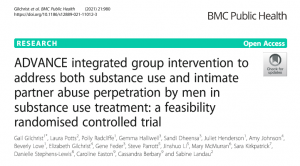The ADVANCE team’s latest publication led by Professor Gail Gilchrist is now available.
Abstract
Background: Substance use is a risk factor for intimate partner abuse (IPA) perpetration. Delivering perpetrator interventions concurrently with substance use treatment shows promise.
Methods: The feasibility of conducting an efficacy and cost-effectiveness trial of the ADVANCE 16-week intervention to reduce IPA by men in substance use treatment was explored. A multicentre, parallel group individually randomised controlled feasibility trial and formative evaluation was conducted. Over three temporal cycles, 104 men who had perpetrated IPA towards a female (ex) partner in the past year were randomly allocated to receive the ADVANCE intervention + substance use treatment as usual (TAU) (n = 54) or TAU only (n = 50) and assessed 16-weeks post-randomisation. Participants’ (ex) partners were offered support and 27 provided outcome data. Thirty-one staff and 12 men who attended the intervention participated in focus groups or interviews that were analysed using the framework approach. Pre-specified criteria assessed the feasibility of progression to a definitive trial: 1) ≥ 60% of eligible male participants recruited; 2) intervention acceptable to staff and male participants; 3) ≥ 70% of participants followed-up and 4) levels of substance use and 5) IPA perpetrated by men in the intervention arm did not increase from average baseline level at 16-weeks post-randomisation.
Results: 70.7% (104/147) of eligible men were recruited. The formative evaluation confirmed the intervention’s acceptability. Therapeutic alliance and session satisfaction were rated highly. The overall median rate of intervention session attendance (of 14 compulsory sessions) was 28.6% (range 14.3–64.3% by the third cycle). 49.0% (51/104) of men and 63.0% (17/27) of their (ex) partners were followed-up 16-weeks post-randomisation. This increased to 100% of men and women by cycle three. At follow-up, neither substance use nor IPA perpetration had worsened for men in the intervention arm.
You can access the paper for free here.

